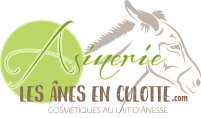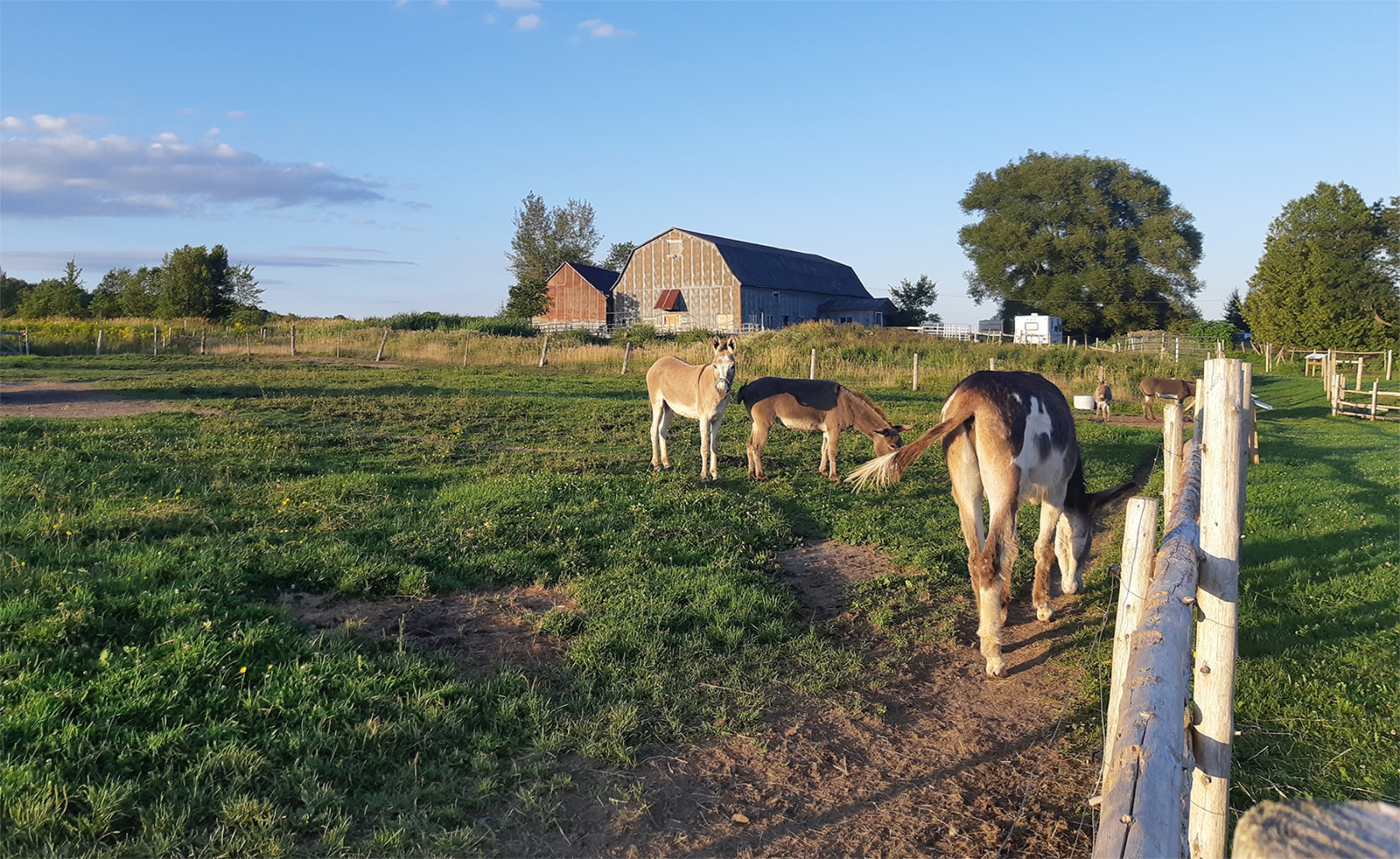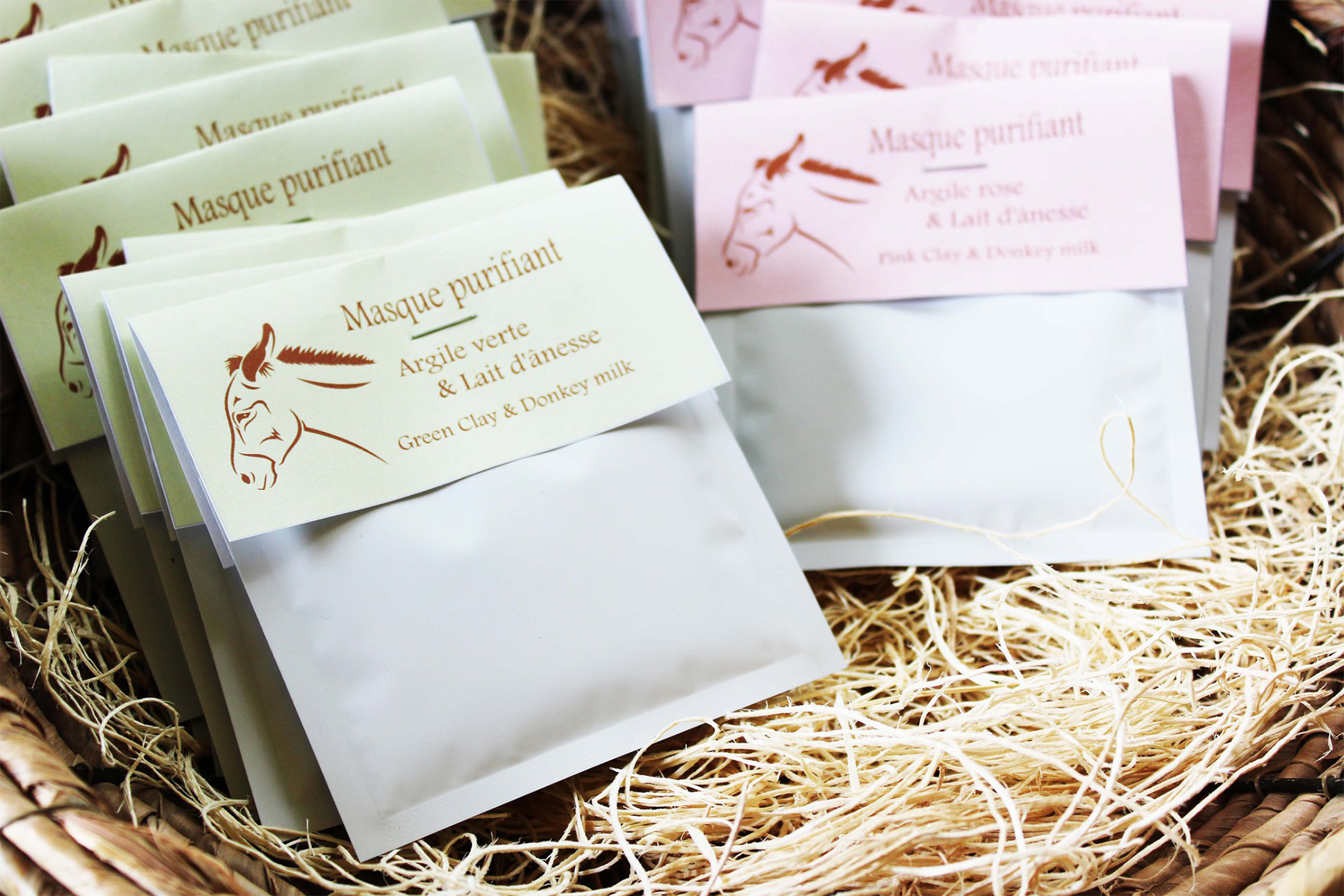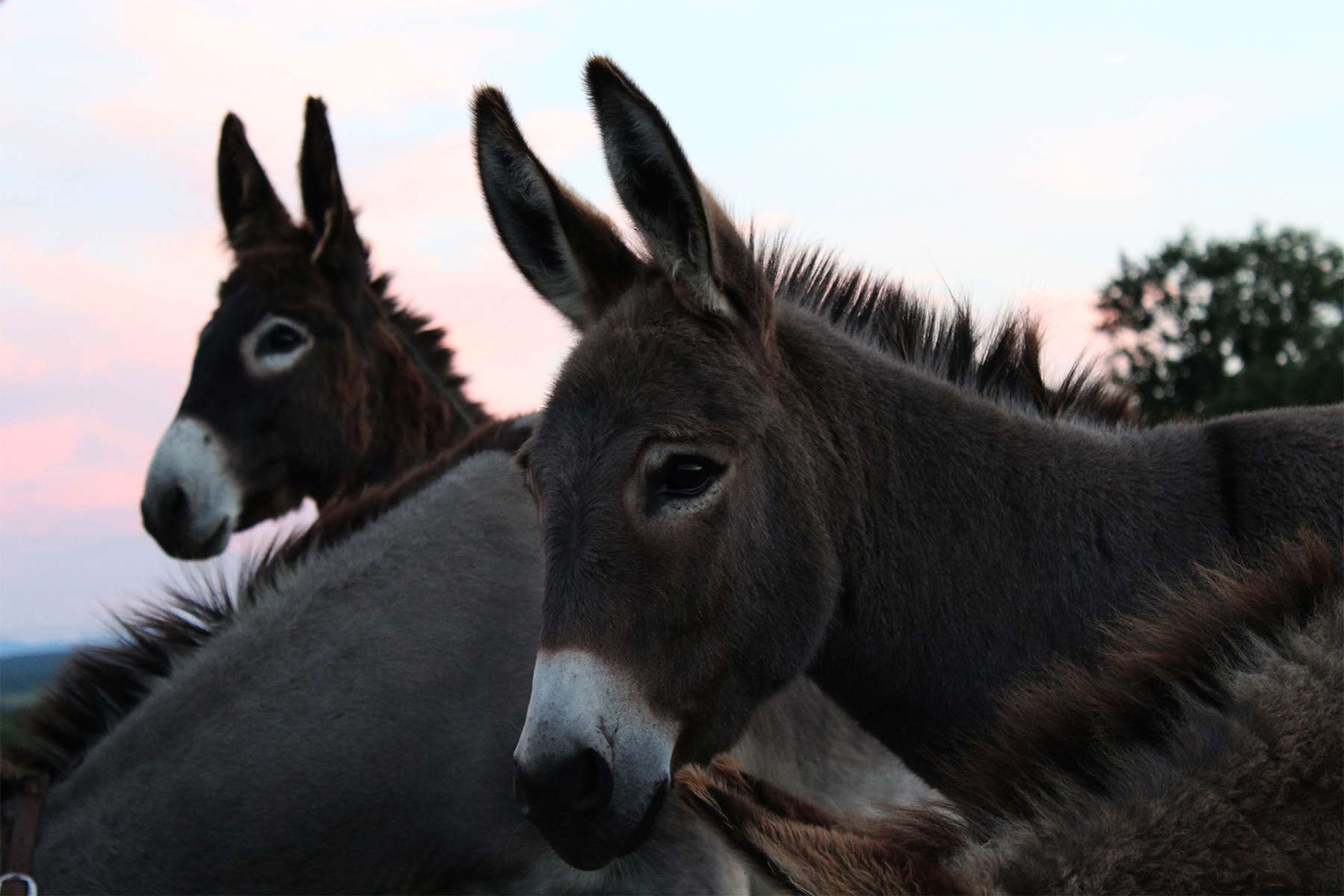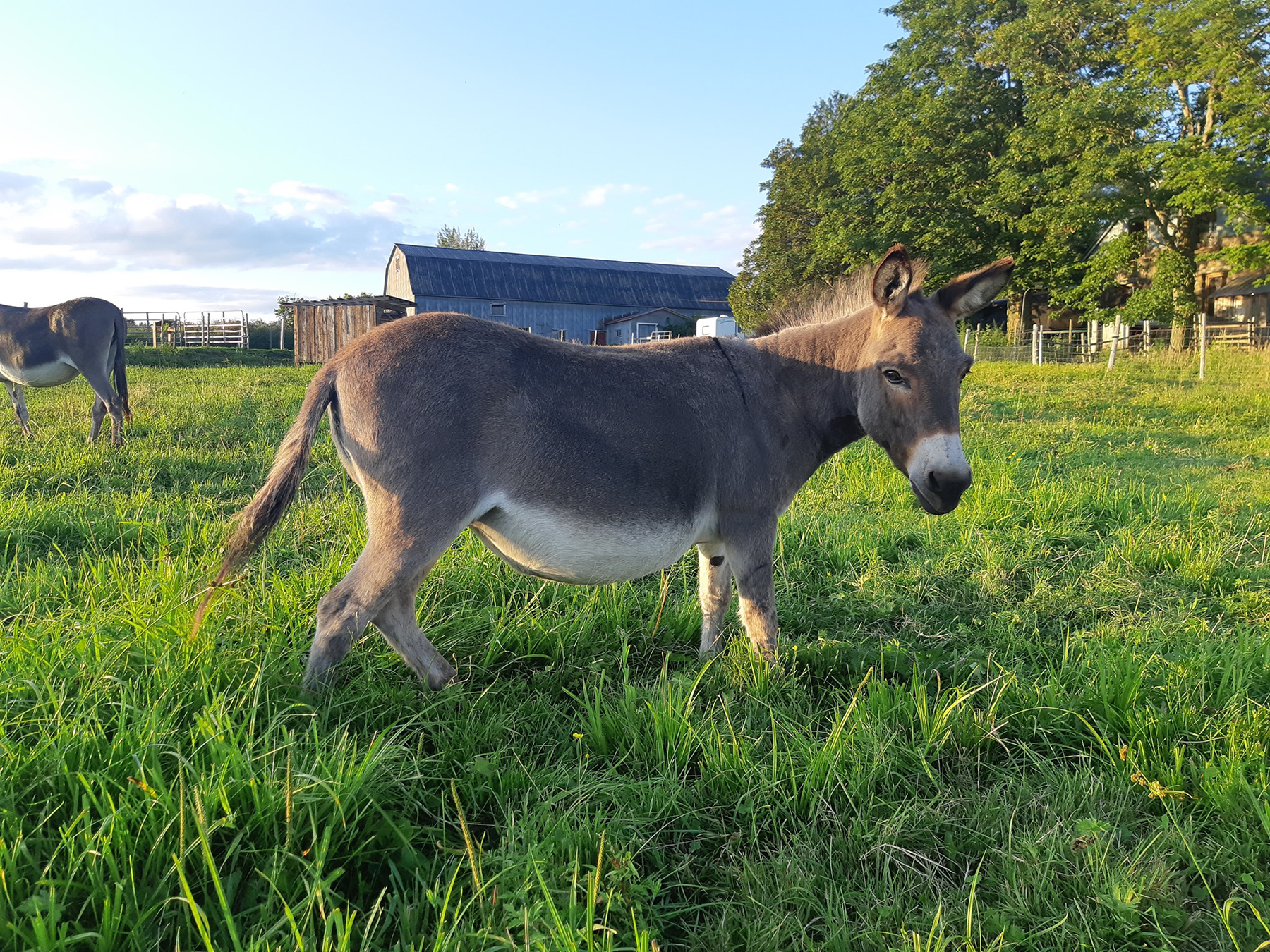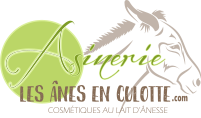-
Visit our donkey farm!
-
Soaps, creams and other cosmetics from natural ingredients
-
Welcome to the website of our family-run donkey farm
-
What is donkey milk?

Animals for sale
Do you want to buy a donkey?
There are different ways to buy a donkey, and each has its pros and cons. Many sellers on “Kijiji” will not ask you questions, nor give you advice or follow-up with your pet. If you are interested in purchasing a donkey from us, we will discuss your project to see if we have the right donkey for you and if you have the buyer profile we are looking for for our donkeys.We will suggest that you meet the young candidates once or twice before they are ready, in order to confirm that their progress corresponds to your expectations or needs. If you stay too far away or don't want to take the time for those few visits, you should probably look to the classifieds.
If you are new to donkeys, we will ask you to take training first. https://www.formationequestreenligne.com/fr/formation/detail/formation-sur-les-anes/
To ensure your facilities are compliant to accommodate a donkey safely and with respect for its welfare, we may require you to become Galahad Approved Shelter, which involves prior inspection.
Thereafter, we will keep in touch to be able to guide you, if necessary, in your daily life with your donkey. Buying a donkey is a long term commitment!
Our breeding methods:
We raise donkeys, so we have births every year. Because the herd cannot grow endlessly, we have to sell most of our young when they are ready, around two years old.This implies that we mainly sell young donkeys. More rarely, adults, when removed from breeding. Sometimes we have donkeys with special needs, that is, they will find their place with people who are more experienced or who already have donkeys.
Our young people are sold around two years old. The weaning of our young is done between 10 and 14 months and we promote natural weaning. This is the key to having balanced young people in their future life. We practice all the methods that reduce the stress of weaning (progressive habituation during temporary separations with the mother, group separations with young people of the same age, group weaning and with the presence of known and caring adults).
https://blog.equisense.com/sevrage-du-poulain/?fbclid=IwAR20B0bg9yO38lc8Ffz5G56-d8NmynBXmI2SFlcDd1WX2KxlTU1hyl8ZAyg
Between weaning and 2 years old, the young donkey’s adolescence takes place. More distant, less close to human, a little rebellious, the young go through this stage in a herd made up of young people of his age and experienced adults who will continue the education started by the mother. This peer education is of paramount importance for the emotional well-being of the youngster and for the development of his identity as an individual within the herd. Some young people finish their teenage years faster than others. Moreover, everyone has their own temperament. Some more calm and impassive, others more mischievous. These characteristics guide us in choosing an adoptive family since the mischievous will require more experience to avoid the occurrence of unwanted behavior.
By two years, 90% of psychological balance and education is acquired. But it remains to maintain the rules and established limits, otherwise undesirable behavior can appear. It is much easier to maintain the rules established from birth by the breeder and the herd than to correct behavior that arose out of lack of supervision. Applying a justified correction does not deprive you of your donkey's affection. On the contrary, this is the way to establish a harmonious relationship where he realizes that he owes you respect and that he must not act with you as if you are a donkey.
None of our young are sold for breeding. All our male donkeys are sold castrated, and our young females are not of reproductive age at the time of sale, around 2 years old. A donkey must be 4 years old before being put to breeding.
Buyer profiles sought:
We favor adoption projects in which the donkey is part of a life project, where it will not be the only one of its kind and where the adopters have some experience with equines. An understanding of basic education principles (positive and negative reinforcement, respect for the bubble and set limits) is essential. Especially for the purchase of young donkeys who can still develop behavior problems if given the opportunity for lack of benevolent authority. Without experience, we will not advise you to buy a young donkey, but rather an adult who is less inclined to test the limits of your benevolent authority.We also do not recommend buying two young people of the same age. The playful side is likely to emerge and an exclusive relationship between the two young people can tend to distance them from a healthy relationship with the human. In fact, we double the risk of seeing unwanted behavior appear.
Our breeding standards are modeled, at best, on good breeding, feeding, grazing, housing, health and education practices for donkeys. We sell people and we favor thoughtful projects, long-term commitments.
Facilities and care to be provided:
In terms of the facilities you will need at the time of adoption, we have the minimum requirements for the safety and welfare of the donkey:-Fencing without barbed wire (prickly prong). This type of fence is extremely dangerous and its use for equines should be avoided. It is possible to make wooden fences of small sections (be careful, donkeys will chomp on the wood) or wire fences with an electric wire over them. The best is still an electric fence with 2 or 3 wire heights. It is possible to use electrified nylon wire or galvanized metal wire, the latter being more resistant to wear and not being less safe for donkeys.
-Closed shelter or box in a farm building, garage etc. Donkeys do not tolerate the cold as well as horses and under no circumstances can they spend the winter outside with only 3-sided summer shelter. Even in an undergrowth. Even in southern Quebec. Donkeys can spend many winter days outdoors, but certain cold / windy / snowy / rainy conditions can cause chills that are dangerous to the health of your donkey. In these cases, he needs a shelter that shields him from the wind and allows him to regulate his temperature.
- First cut hay feed of good quality in small square bales. Too rich hay will cause excessive weight gain which can lead to serious health problems. Equine respiratory tracts are sensitive to dust, and round bale hay is always dustier than small square bale hay. In addition, the risks of botulism are higher with the round bale. This poisoning, most common in equines, is most of the time fatal. Having to store small balls for the winter means having enough space for them. Count ½ bale of hay (5-8 kilos) per donkey and per day, over a period of 8 months if your donkey will have access to pasture in summer (120 bales), or 12 months if there is no access (180 balls).
- No supplements, except in special circumstances, but provision of a block of minerals for horses, essential ... The hay produced in Quebec is devoid of Selenium, an essential trace element and the other vitamins and minerals are not necessarily balanced. As we do not feed (too much calorie intake) the block of minerals is more than desirable.
- Trimming by a farrier every 6-8 weeks in summer, can be up to 12 weeks in winter depending on the growth of the horn. It is essential for good foot health and prevents postural imbalances that can lead to tendon or joint injuries.
- Administration of dewormers at least 3 times / year under veterinary supervision. An annual visit from an equine veterinarian will allow you to have the appropriate deworming program for your animal. The cost is tiny compared to all the problems that regular deworming avoids. Garlic is not an attractive and safe alternative ...
- Access to sufficient exercise space and, where possible, to grazing space in season. Donkeys need restricted grazing in order to prevent overfeeding during the summer. The ideal is to have two pastures of modest size and to rotate. ½ to 1 acre per donkey is more than sufficient depending on the quality of the pasture.
- A donkey needs a donkey to express the full range of its natural social behaviors. A friend of another species may provide some occupation for a donkey, but for his psychological well-being, it is ideal to be able to offer him another donkey as a companion.
